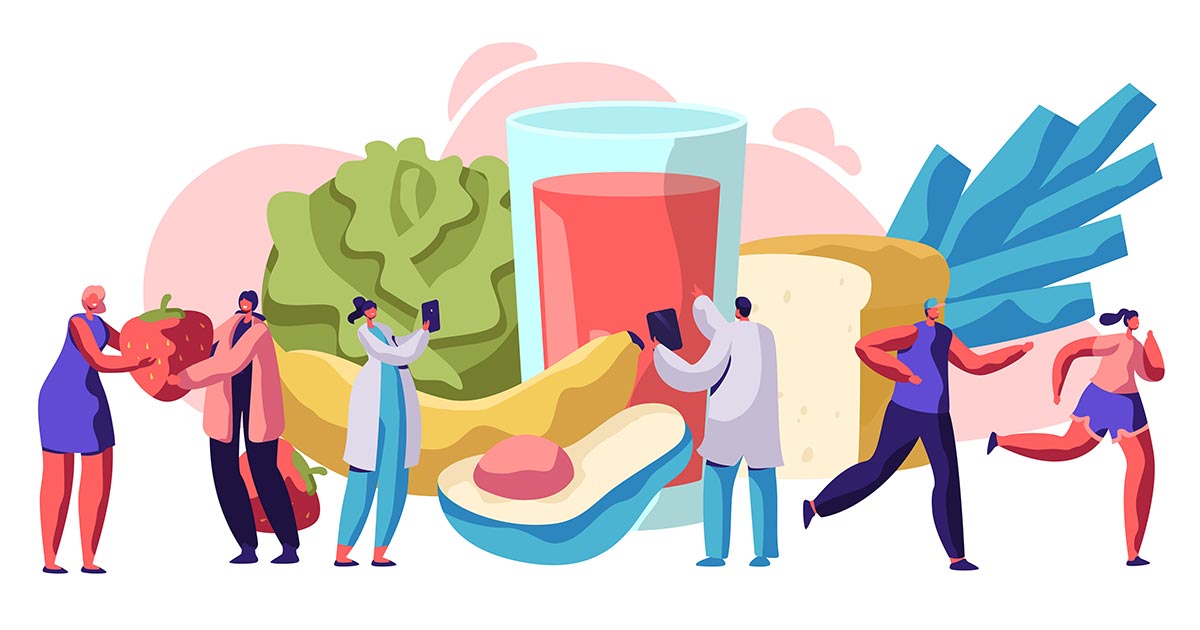The Do’s and Don’ts of Eating for Energy
Advice to improve your movement, fitness, and overall health from the world's #1 in orthopedics.
Imagine trying to drive your car around with an empty tank. That is how your body functions when it has no energy. Eventually, you will not be able to continue. “Energy provides the body with proper nutrients to function,” says Danna Raphael, RD, CDN, a clinical nutritionist at HSS. The body’s main source of energy? Food.

“Food should not be seen as ‘good’ or ‘bad,’” Raphael says. Eating foods you think of as being unhealthy can often lead to feelings of guilt. But “all foods fit in a well-balanced diet. That means having a little chocolate or a couple of cookies, even daily, is okay. So enjoy the treat, and just remember that it’s all about the portions.”
If your goal is to eat to maintain your energy throughout the day, Raphael offers a couple of guidelines to follow to keep your engine humming.
Do eat breakfast.
“Eating a well-balanced, protein-rich breakfast has been shown to help reduce cravings later, like that 3pm snack slump,” says Raphael. It also helps you choose healthier foods throughout the day.
Eggs are a great option, made even better in an omelet with vegetables, which adds fiber to keep you fuller longer. “Oatmeal—but not the kind that comes in packets loaded with sugar—with a tablespoon of peanut or another nut better, 2% plain Greek yogurt or cottage cheese are all good, protein-rich options,” she adds.
Even dinner leftovers like grilled chicken made into a sandwich or vegetables with brown rice can be a healthy first meal.
“Sausage, bacon and other cured meats are good sources of protein, but they are also very high in salt and saturated fats, so you should limit how much of these you eat,” says Raphael.
Don’t go hungry.
Eating regular meals and snacks helps keep your energy at an even level, without highs and lows. “Aim to eat every three to four hours. That means three small-to-moderate-size meals and two snacks,” says Raphael. Make them well balanced, and include complex carbs, proteins, and fats.
For a snack, the Instagram-famous avocado toast is actually an ideal option, if you use a slice of whole wheat bread and half an avocado. “You get healthy fat from the avocado and complex carbohydrates from the bread,” she says. “Sprinkle with a little cheese or nuts for some protein. You can also add an egg to make it a meal.”
Another snack idea that will keep you fueled? Hummus with vegetables. “The chickpeas in hummus are a good source of both complex carbohydrates and proteins, and the tahini paste is made from sesame seeds, which are high in healthy fats,” says Raphael. “Dipping vegetables like carrots, cucumber, peppers, broccoli, or snap peas will give you an added fiber boost and help keep you satisfied. Add a whole wheat pita and another source of protein like chicken, lamb, fish, or falafel for a meal.”
Do focus on complex carbohydrates.
They may have a bad reputation, but carbohydrates are your body’s preferred source of energy. “Refined carbohydrates such as white bread, pasta, candy, cakes, and biscuits are often referred to as ‘simple sugars’ because they are released quickly into the bloodstream and can lead to energy spikes that are followed by crashing energy lows,” she says. “These are the ones you want to limit.”
Complex carbohydrates, on the other hand, burn strong and slow, mainly due to their fiber and protein content. This means they take more energy to be broken down and are digested slower than your average simple carb. “Complex carbs also help stabilize the blood sugar and provide a steady supply of energy,” says Raphael. “You can find an abundance of these in whole grains like oats, brown rice, millet, quinoa, beans and some starchy vegetables like sweet potatoes or winter squash like butternut, acorn or pumpkin.”
Don’t forget protein.
“Proteins form the building blocks for our muscles and most body tissues,” says Raphael. Protein takes more energy to digest than carbohydrates, and therefore takes longer to process through your system. “This helps you feel satisfied longer, but more importantly, it helps keep your energy up,” she adds. Protein is found abundantly in meat, fish, poultry, dairy, beans/legumes and nuts/seeds.
Do eat some fat.
Dietary fat is essential for maintaining overall health. In fact, your body needs regular intake of fat. A few of the many ways the body uses fat is by giving your body energy, helping to absorb some key nutrients, and protecting your organs.
“The type of fat you eat does matter, however,” says Raphael. The two main types of fats are saturated and unsaturated. “Saturated fat is generally solid at room temperature and is primarily found in animal products, high-fat dairy foods and processed foods like desserts and fried foods. Unsaturated fats are known as the healthy fats and are found in avocados, nuts and seeds, and plant oils like olive and canola. Fatty fish like salmon, mackerel and sardines are also high in unsaturated fats.”
Don’t forget about water.
Drinking enough water is crucial for your body to function. “It is recommended to aim for at least 6 to 8 cups daily, but generally people need more, especially if you exercise,” she says. Your fluid intake does not only come from water, but also from foods with high water content like cucumbers, watermelon, strawberries, celery and, surprisingly, cauliflower, which is about 92% water, Raphael adds.
Do check your iron.
Iron deficiency can lead to feelings of fatigue, both physically and mentally. In addition to red meat, great sources of iron are beans and lentils, spinach, and sesame seeds. Vitamin C helps absorb iron and many plants that contain high levels of iron are also rich in vitamin C (think: spinach and broccoli). Other sources of vitamin C that help boost the absorption of iron are citrus, strawberries, and peppers.
Don’t eat too many processed foods.
Swap out processed foods (yes, this includes energy bars) for more natural whole foods. “Always be sure to read ingredients,” says Raphael. “If it sounds like something you could make in your own kitchen, great; if it reads like a foreign language, it is best to skip it. Choose an apple with 1 tablespoon of natural peanut butter, or plain low-fat Greek yogurt sprinkled with a few chopped walnuts instead of that glorified candy--I mean, energy--bar.”
Do get enough sleep.
It’s not technically a nutrition recommendation, but melatonin is also a crucial aspect of energy maintenance. Many are unfamiliar with this hormone, which the body naturally produces to help regulate your body’s internal clock, helping you to sleep. Getting enough rest helps us feel more energized throughout the day. Best of all, you don’t even need a supplement! “Pistachios, almonds, goji berries and tart cherries are a few great sources of melatonin,” says Raphael. Eat them separately or mix them together for a pre-bedtime snack.
Don’t skimp on B12.
“This important vitamin helps convert food to the energy your body needs,” she says. Eating a diet rich in fruits, vegetables, whole grains, meat, and fish will help you avoid a B12 vitamin deficiency.




